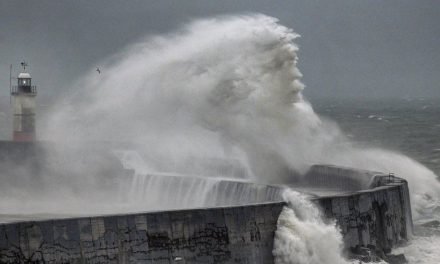Written by Jemima Webber / LIVEKINDLY
How can your personal choices protect the oceans and marine life? Follow these nine steps that promote ocean conservation and preservation.
For centuries, humankind has marveled at the ocean. It covers more than 70 percent of the planet’s surface and produces more than half of the world’s oxygen. It’s home to between 700,000 and one million species and most of these are yet to be named or described. Some scientists believe the deep sea could contain as many as 100 million species, but it’s difficult to track since more than 80 percent of the ocean is unmapped and unexplored.
Is The Ocean Dying?
The ocean is astonishing, but it’s also deteriorating. A report published in the journal Current Biology in 2018 found that 87 percent of the world’s oceans are dying. Just 13 percent of oceans have intact marine ecosystems “untouched by the damaging impacts of humanity,” The Guardian reported last year.
“We were astonished by just how little marine wilderness remains,” lead researcher Kendall Jones from the University of Queensland, Australia, and the Wildlife Conservation Society, said to The Guardian. “The ocean is immense, covering over 70% of our planet, but we’ve managed to significantly impact almost all of this vast ecosystem.”
The World Wildlife Fund (WWF) also acknowledges that human activity has “pushed oceans to their limit.”
Overfishing, plastic pollution, rising sea levels, and climate change are to partly blame for the ocean’s fading state. These issues can feel irreparable, incomprehensibly large, and certainly impossible for the average person to tackle. But there are ways you can instil change, and in honor of World Oceans Day — which falls on June 8 — here are nine of them.
9 Easy Ways You Can Protect The Oceans
1. Ditch Seafood

Good Catch Foods makes realistic seafood out of plants | image: atomicvegans/Instagram
Unsustainable fishing is the “largest threat to ocean life and habitats,” according to WWF. Ninety percent of the world’s fisheries are fully exploited or overfished and billions of fish and other marine animals die every year as by-catch — animals caught unintentionally while targeting other species.
Experts predict that the world’s oceans will be void of fish by 2048. According to the World Wildlife Federation, the planet’s fishing fleet is two to three times larger than our oceans can support.
Parts of the seafood industry have turned to fish farming for an answer to declining wild fish stocks, however, WWF points out that farming fish and shellfish still harms wild fish due to the pollution the farms generate, increased parasite loads, and the requirement to catch wild fish as feed. Research shows that it takes more than 5 pounds of wild fish to grow 1 pound of farmed salmon.
Additionally, farm-raised fish come with health risks. Overcrowded fish farms lead to higher rates of disease and infestations, motivating the increased use of antibiotics. More than 80 percent of all antibiotic use in the United States goes toward feeding livestock, and it’s said that farmed salmon are fed more antibiotics per pound than any other livestock in North America, Huffington Post reports. Farmed fish often have higher levels of unhealthy fats and more PCBs, highly toxic industrial compounds.
The rise in cruelty-free, plant-based seafood allows people to enjoy the food they love without hurting the ocean or the beings living in it. A great deal of the most popular seafoods are available vegan. Good Catch Foods uses a protein blend of peas, soy, chickpeas, and lentils to make realistic, plant-based tuna. Terramino Foods uses mushrooms to make vegan salmon burgers. Quorn recently launched Vegan Salt & Vinegar Battered Fishless Fillets and Vegan Lemon & Pepper Breaded Fishless Fillets, and New Wave Foods makes sustainable vegan shrimp and has plans to make plant-based crab and lobster. If you can eat it, you can probably make it vegan.
2. Go Plastic-Free

Buying a reusable coffee cup can help reduce waste | image: jococups/Instagram
People are talking about plastic more than ever with more recognizing the heavy impact the material has on our planet. “Plastic accumulating in our oceans and on our beaches has become a global crisis,”writes the Center for Biological Diversity. “Billions of pounds of plastic can be found in swirling convergences that make up about 40 percent of the world’s ocean surfaces.” By 2050, there will be more plastic in the sea than fish, it says.
Every year, thousands of seabirds, sea turtles, seals, whales, dolphins, and fish are killed after mistakenly consuming plastic or being tangled in it. And the issue is only growing. In the first decade of this century, humankind produced more plastic than all of the plastic in history up to the year 2000, Center for Biological Diversity highlighted, and over the next decade, the fossil fuel industry plans to increase plastic production by 40 percent.
Plastics take years to break down, some taking hundreds or even more. Plastic bags, for example, can take up to 1,000 years to decompose, therefore, “every bit of plastic ever made still exists,” according to the EPA.
Many are choosing to boycott plastic to alleviate some pressure on the oceans and marine life. You can purchase reusable water bottles instead of buying disposable plastic ones. Invest in some stainless steel straws and keep them with you when you go out (and make sure to ask for drinks without straws when ordering). When buying groceries, take a reusable shopping bag and choose produce that isn’t wrapped in plastic packaging. JOCO makes reusable coffee cups which you can take to your favorite cafe to avoid getting a plastic-lidded, disposable cup. JOCO cup purchases will save more than 75,000 pieces of plastic from being discarded this year alone.
3. Keep Beaches Clean

Take your litter with you when you leave the beach
Keeping our coastlines clean is a simple way to do your part and help the planet. After a day at the beach, ensure you’ve taken everything with you, including rubbish and belongings. “Leave nothing behind but your footprints,” so they say.
One initiative called Take 3 For The Sea encourages people to take three pieces of rubbish with you when leaving the beach or any other body of water. “Wherever we are, we are connected to the sea. The ocean provides us with the oxygen we breathe and the climate that sustains us. We need a healthy ocean for our own survival,” the campaign writes online. Already, it helps remove 10 million pieces of rubbish every year in 129 countries. UK-based charity Surfers Against Sewage organizes regular clean-ups.
As well as being conscious of litter, you can lessen your mark on the ocean by wearing reef-safe sunscreen. Common sunscreen chemicals like octinoxate and oxybenzone can harm ocean life. The latter “leaches the coral of its nutrients and bleaches it white. It can also disrupt the development of fish and other wildlife,” NPR reported.
Search for sunscreens made with eco-friendly, vegan ingredients like Thinksport’s Safe Sunscreen or Sun Bum’s Mineral Sunscreen Lotion.
4. Buy Cruelty-Free Fashion

Rothy’s makes vegan shoes out of recycled plastic | image: sadesolomon/Instagram
There are certain fashion products you can avoid to lessen your impact on our oceans, including coral reefs. Coral and pearl jewelry, shark products, and tortoiseshell hair accessories, which are made from endangered hawksbill turtles, all take a toll on our ecosystem.
Instead, you could buy cruelty-free and vegan accessories. Some items you purchase could even help clean up the planet; these bracelets are handmade in Bali from recycled materials, and every time you buy one, 1 pound of trash will be removed from the ocean and coastlines. Rothy’s repurposes single-use plastics by turning them into vegan footwear. The company has already used more than 20 million ocean-bound water bottles to make flats, sneakers, and loafers. English designer Stella McCartney has previously partnered with Adidas to launch sustainable vegan shoes made from recycled polyester and ocean plastic.
And every pair of these board shorts is made with 11 recycled plastic water bottles. Even the button fly and d-ring are made from recycled ocean trash.
5. Support Ocean Conservation

There are many non-profits working to reduce ocean pollution
Got some spare change? Consider making a donation to an organization working to help the oceans. There are plenty out there doing good work for our planet. Sea Shepherd Conservation Society is an international non-profit that strives to end ocean habitat destruction and species extinction with direct-action tactics that expose illegal activities on the high seas.
Oceanic Preservation Society works to “expose the truth” and raise awareness about oceanic issues. “We create films, inspire awareness and action through visual displays, and collaborate with partners to champion a humane and sustainable future,” it writes on its website. The Society was behind the award-winning 2009 documentary “The Cove,” which uncovered the capture and slaughter of dolphins in Taiji, Japan.
The American Cetacean Society helps protect the habitats of whales, dolphins, and other marine animals through educational programs and research grants, while Oceana works to boost biodiversity in our waters by changing policies and regulations in the countries that control such matters, creating lasting change for oceans and marine life.
6. Make Your Cleaning Products Planet-Friendly

Some cleaning products are more environmentally friendly than others | image: koalaeco/Instagram
Being mindful of what cleaning products you use is another effective way to minimize your impact on Earth. “Even if you don’t live near the coast, water—and anything else—that goes down your drain can eventually end up in the ocean,” The Ocean Portal points out online.
Chemicals like pesticides and household cleaners can move through waterways and eventually end up in the sea, impacting the health of oceans and the animals in them.
“Untreated sewage, garbage, fertilizers, pesticides, industrial chemicals, plastics … most of the pollutants on land eventually make their way into the ocean, either deliberately dumped there or entering from water run-off and the atmosphere. Not surprisingly, this pollution is harming the entire marine food chain – all the way up to humans,” according to WWF.
Opt for organic, vegan products and limit chemical use when possible. Sweep your driveway rather than water it to stop oil and other residue from running into storm drains. You can often use simple, non-toxic ingredients like baking soda, vinegar, or lemon juice to complete many household chores.
7. Travel More Kindly

Choose an eco-friendly holiday when setting off on your next adventure
The world is a beautiful place and many of us want to explore it. Before you embark on your next adventure, do some research on eco-friendly travel companies that are working to make the planet better. WWF recommends, “Consider booking your next trip through a responsible travel company that’s committed to protecting wildlife, empowering local communities, and using guides who are aware of rules and best practices.”
Responsible Travel screens companies — including tour operators and hotels — before advertizing them on its website. It offers more than 5,000 adventures all over the world, including hiking, diving, kayaking, and trips to Antarctica. The businesses on Responsible Travel’s site must meet specific environmental, social, and economic standards to be approved, meaning you can focus on enjoying yourself and rest easy knowing that your holiday isn’t costing the planet.
Good Travel Company conducts environmental audits on all of the hotels, packages, and tours associated with its name. It takes into account energy use, recycling policies, use of local labor, and the products involved, then displays a sustainability scorecard with the item’s environmental impact, community connection, and conservation rating.
“Once you arrive at your destination, be respectful of marine life and habitats, such as nesting sea turtles on beaches and sensitive coral reef systems,” WWF adds. If you go on a dive or snorkel, ensure to steer clear of coral reefs as touching or accidentally kicking coral can harm or kill it.
Many people also avoid dolphin and turtle encounters due to animal welfare concerns. Wild animals kept in captivity often suffer from stress and anxiety and are more prone to illness. Forcing exotic animals to perform for human benefit is viewed as animal cruelty by many. Thankfully, there are plenty of ways to holiday without relying on animal exploitation, like kayaking, whale watching, hiking, or swimming alongside wild dolphins, sea turtles, or sea lions in certain parts of the world. You could also visit a marine animal sanctuary.
8. Cut Your Carbon

Reducing your carbon emissions can help boost the ocean’s health
You might have heard about carbon dioxide and it’s heavy impact on our planet. Carbon emissions drive global warming, which increases water temperatures, raises sea levels, causes coral bleaching, shifts species distributions, and ups ocean acidity. The ocean stores 50 times more carbon dioxide than our atmosphere, so keeping levels low is important for the health of the sea.
You can reduce your carbon footprint by driving less, line-drying your clothes, eating locally and organically, planting gardens, and unplugging your devices when you’re not using them. In the U.S., “vampire power” accounts for $19 billion in energy costs a year.
The most effective way to lower your carbon emissions is to ditch meat. Animal agriculture generates more greenhouse gas emissions than every mode of transport – every car, bus, train, and plane on Earth – combined. Emissions from animal agriculture are more problematic than fossil fuels, so swapping to vegan meat instead is a powerful way to help the planet and our oceans.
Plant-based meat is having a moment, with new brands emerging all the time. This means you don’t have to “sacrifice” anything to give up meat, just choose cruelty-free next time you go grocery shopping. Are you a fan of chicken nuggets? MorningStar Farms makes vegan ones. Meat pies? Try Fry’s. More of a steak person? That’s cool, Vivera makes those. Beef burgers? Try Linda McCartney’s quarter pounder burgers or Beyond Meat’s iconic Beyond Burger. You get the gist. Shop around and enjoy finding your new favorite!
9. Go Vegan

Beyond Meat makes vegan meat that looks, cooks, and tastes like beef | image: beyondmeat/Instagram
Ditching meat is a great start to helping the planet and those who inhabit it, but the most effective way to minimize your mark on Earth is by going fully plant-based. Last year, the most comprehensive analysis of farming’s impact on the planet was published in the journal Science. The study aimed to understand the environmental impact of different food industries by analyzing data from around 40,000 farms in 119 countries.
Oxford University researcher Joseph Poore, who led the study, said about the work, “A vegan diet is probably the single biggest way to reduce your impact on planet Earth, not just greenhouse gases, but global acidification, eutrophication, land use and water use.”
“It is far bigger than cutting down on your flights or buying an electric car,” he said, as these tactics only reduce greenhouse gas emissions. “Agriculture is a sector that spans all the multitude of environmental problems. Really it is animal products that are responsible for so much of this.”
More people than ever are tuning in to information about the impact of animal products on the planet, animals, and our health. As interest grows, so do the number of vegan products that are available, leaving us with endless amounts of delicious vegan food, beauty products, and cruelty-free wares, making it not only easier to go vegan, but more enjoyable. Not a sacrifice, but a gain. And as the planet needs us more than ever to step up and lend a hand, a plant-based, cruelty-free lifestyle could just be the best way to do so.














